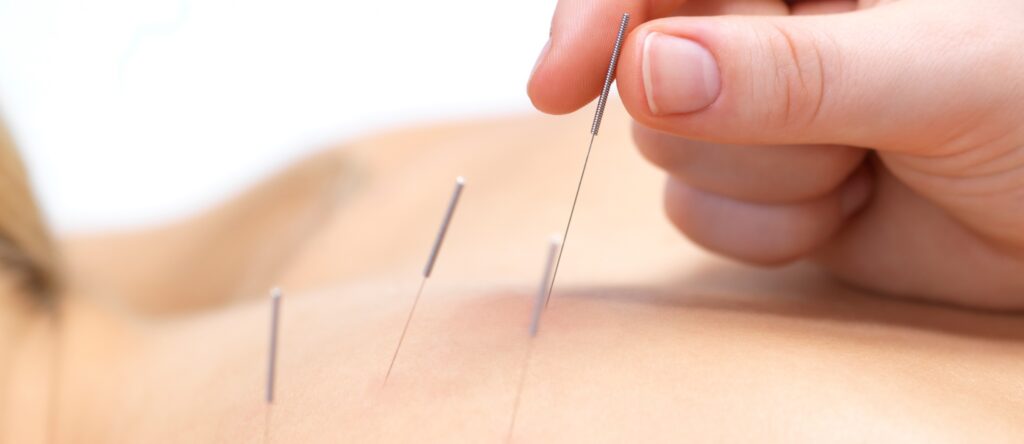
Inserting stainless steel needles into specific points in the body to treat myofascial pain is not uncommon to be used among acupuncturists and other health care professionals. Dry needling has been widely used in Western countries for a few decades while an ancient Chinese medicine remedy called acupuncture has been used for thousands of years.
Patients with different conditions have benefited from minimal invasive needle therapy. The research has proved the existence of acupuncture points and the effectiveness of both acupuncture and dry needling on a variety of conditions. What are the differences between acupuncture and dry needling? What are the benefits and risks of them?
What are Acupuncture And Dry Needling? Chiropractor Near Me

In the human body, there are more than 2,000 acupuncture points (or also called acupoints) that connect together to form channels or meridians. There are 14 meridian channels in the body. An energy flow also known as Qi is running via these pathways to organs, structures and systems in a particular pattern.
Any disruption or blockage of the flow of energy at certain acupuncture points will present correlated health issues. Acupuncturists apply thin stainless steel needles at certain acupuncture points to improve the flow of Qi in order to cure a wide range of conditions.
The name of dry needling derives from the contrast of “wet needling”, which injects saline or local anesthetics for a particular purpose. Dry needling is also called intramuscular stimulation or trigger points acupuncture. The origination of dry needling has been debated between Chinese medicine and Western medicine practitioners.
Traditional Chinese medicine doctors believe that dry needling is not a new treatment method that actually originates from Ashi point acupuncture or a simplified version of Chinese acupuncture for myofascial pain whilst physical therapists believe that dry needling was discovered by Dr. Janet Travell in the 1940s.
What Are The Benefit Of Acupuncture And Dry Needling? Chiropractor Near Me

Acupuncture and dry needling have a lot of similarities and differences. Dry needling focuses on myofascial trigger point relief, so is normally applied where the muscle nodules are. In contrast, acupuncturists combine a few acupuncture points (not in the pain site) in the same or different pathways to encourage the flow of Qi.
Research has found the locations (in the pain site) of applying dry needling always overlap acupoints. Both acupuncture and dry needling have analgesic effects that stimulate the endogenous opioid system in the brain by activating acupoints. A series of multiple transmitters and modulators (endtigebiys opioids, cholecystokinin octapeptide, 5-hydroxytryptamine, glutamate, noradrenalin, dopamine and so on) regulates and reduce pain.
Dry needling vs Acupuncture
Dry needling dominantly uses to relieve muscle pain or chronic pain in physical therapy while acupuncture can help with not only musculoskeletal conditions including sports injury, neck pain, lower back pain and knee pain but also anxiety, depression, insomnia and so on. Electro-therapy can further promote the effectiveness of both acupuncture and dry needling, especially the effect of analgesics.
| Acupuncture | Dry Needling | |
| Types of needles | Solid filiform needles or hollow-core hypodermic | Depending on the number of myofascial trigger points |
| The applied locations | Acupuncture points or acupoints (inserting needles based on the blockage of the correlated acupoints) | Myofascial trigger points (inserting needles in the pain site) |
| Number of needles | Depending on the conditions that may require the combined use of a few acupuncture points | Depending on the numbers of myofascial trigger points |
| Functions | Analgesic effect Enhance natural healing abilities to reduce pain and help internal diseases | Analgesic effect Deactivated trigger points to reduce pain |
Risks Of Dry Needling And Acupuncture? Chiropractor Near Me

Using sterile thin needles to penetrate the skin is an invasive treatment that comes with certain side effects. The most common side effects are bruising, bleeding and muscle aching. Some patients may feel nausea, dizziness and cold sweat. Skin rash and allergic reactions may happen in very rare cases.
Non-sterile needles and non-standardized operation may cause infection. Incorrect utilization of needles such as insertion depth and angle in the surface areas of the lung may lead to pneumothorax.
In Australia, there are no formal regulations or organizations that issue licenses to dry needling providers. It is sometimes inevitable to have mild side effects after needling that may minimally injure blood vessels and muscle tissues. However, well-trained and licensed chiropractors, healthcare practitioners and acupuncturists can significantly reduce the incidence of severe side effects during and after needle therapy.
